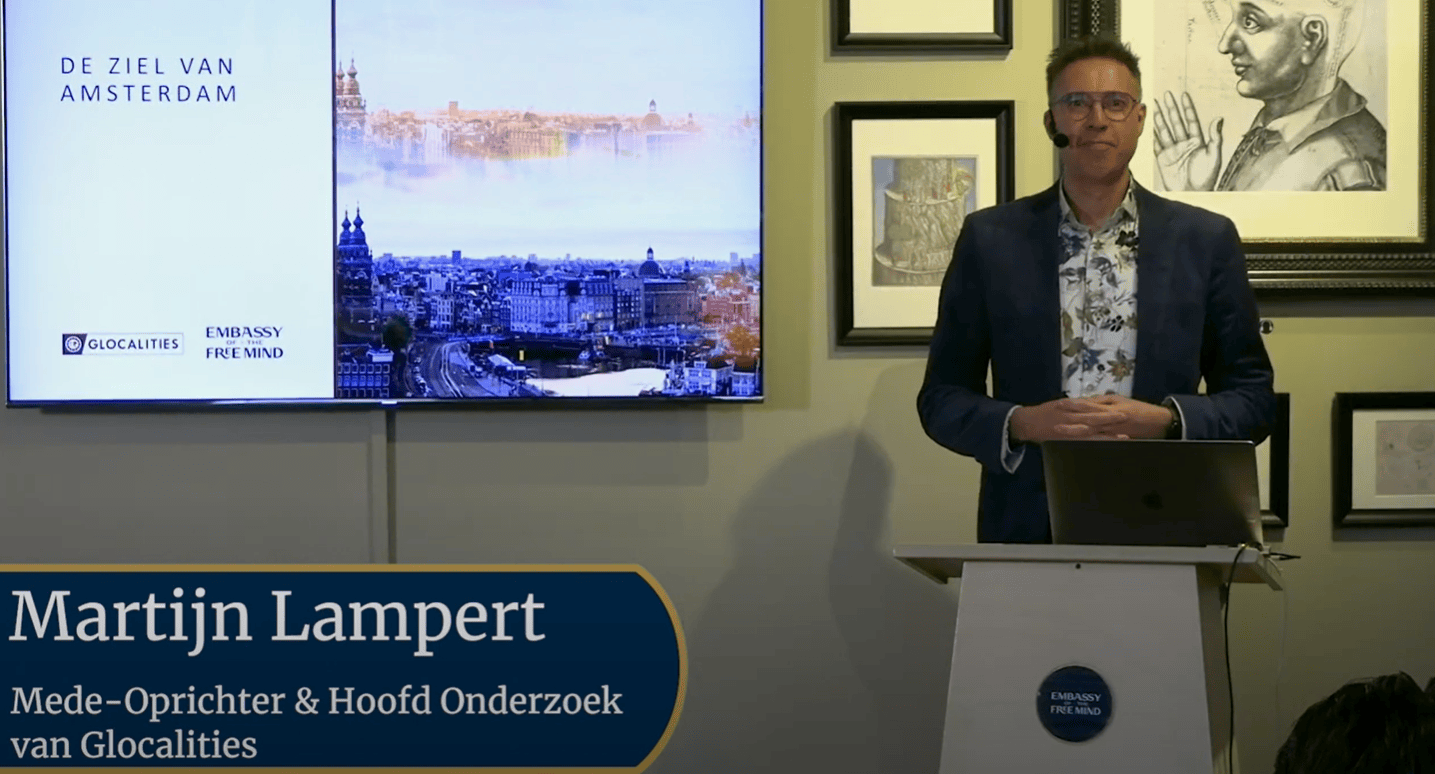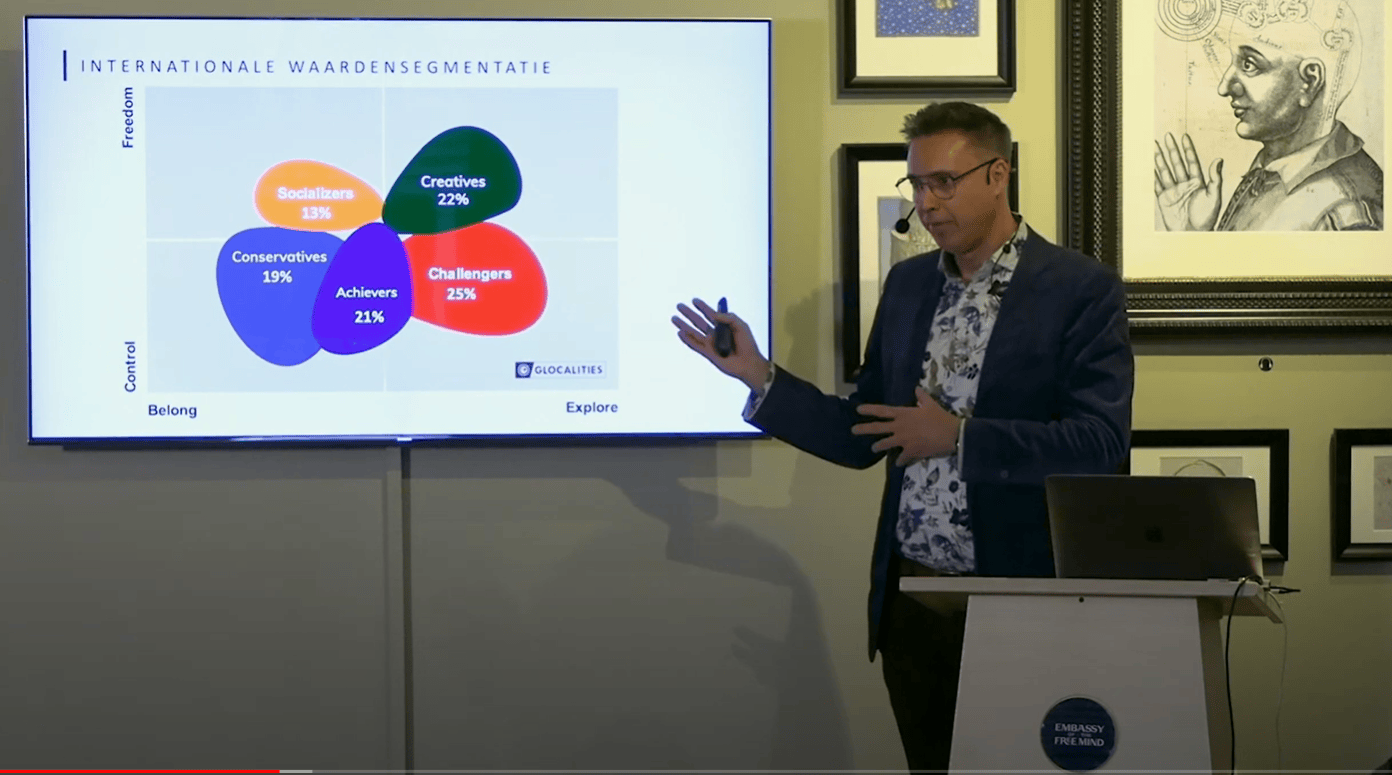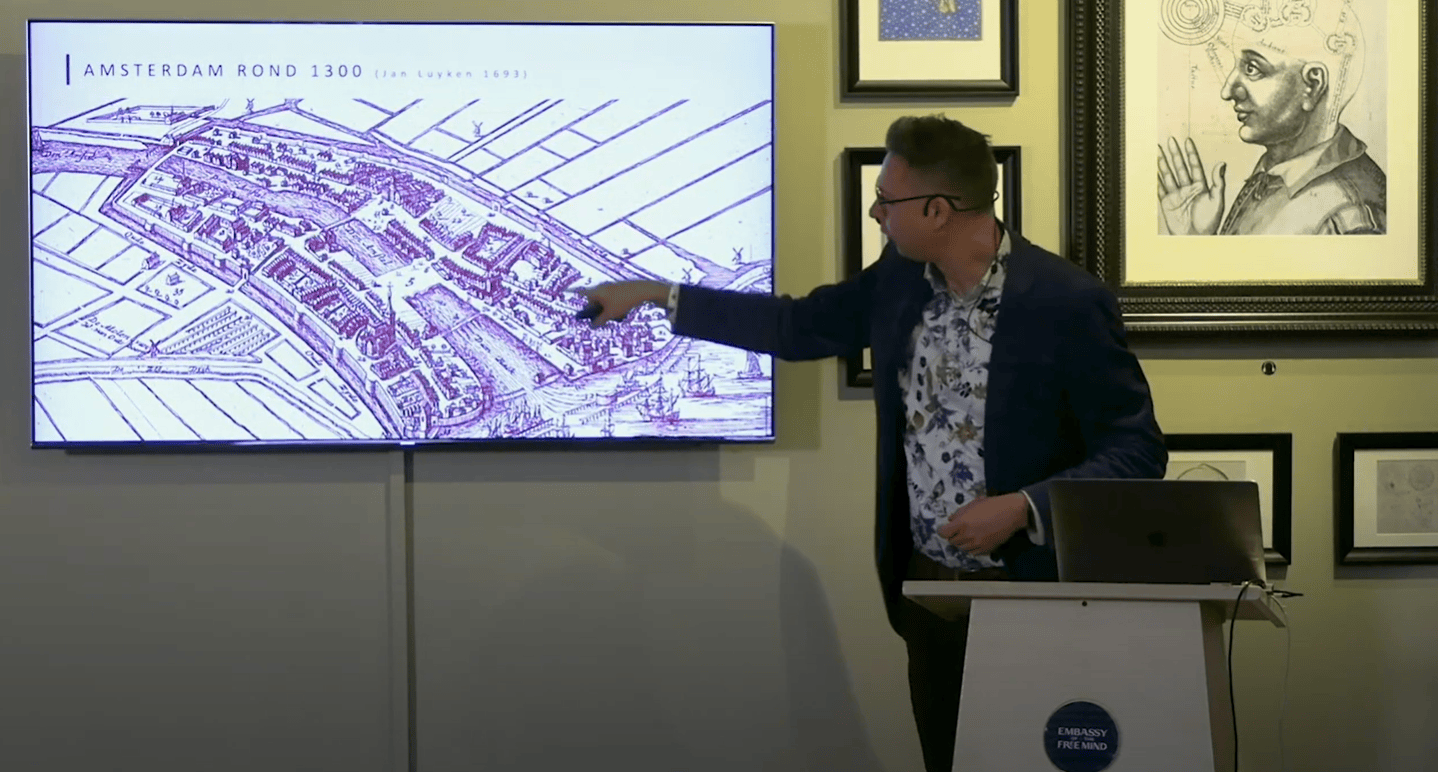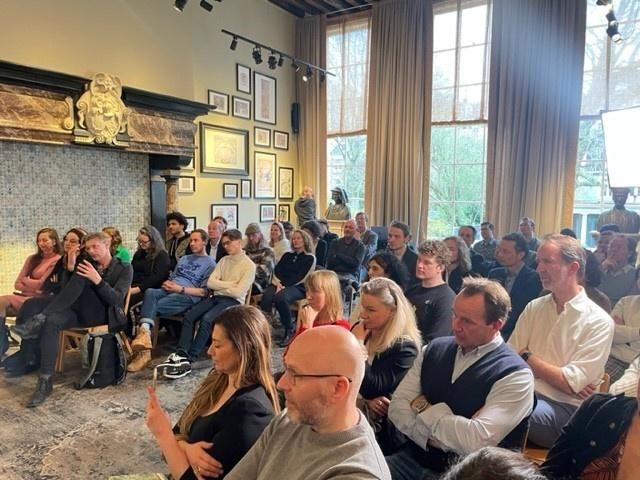Presentatie Onderzoek naar de Ziel van Amsterdam
Presentation Research The Soul of Amsterdam
Op 29 Maart hielden wij de presentatie van het onderzoek De Ziel van Amsterdam, in samenwerking met de Embassy of the Free Mind. Op deze pagina kunt u de samenvatting en videomontage van de presentatie bekijken. De slides van de presentatie zijn beschikbaar als download via het onderstaande formulier.
Programma
De gasten werden welkom geheten door Jasha van der Wel, Programmamaker bij de Embassy of the Free Mind. Vervolgens werden de uitkomsten van het onderzoek gepresenteerd door Martijn Lampert, onderzoeksdirecteur en medeoprichter van Glocalities. Tot slot volgde een paneldiscussie over implicaties van het onderzoek met Eva de Klerk (Culturele Projectontwikkelaar & adviseur subsidieregeling Aanpak Binnenstad), Farid Tabarki (Oprichter Studio Zeitgeist, reiziger, trendwatcher & auteur), Isis van der Wel (DJ ISIS, bestuurslid Amsterdamse Kunstraad & voormalig nachtburgemeester Amsterdam) en Han Bakker (Adviseur Embassy of the Free Mind & Internationaal cultuuradviseur), waarna er gelegenheid was tot discussie met de aanwezigen in de zaal.

Achtergrond en opzet van het onderzoek
Wat is de ziel van Amsterdam? Hoe komt deze tot uitdrukking in de drijfveren van Amsterdammers? En wat betekent dit in een tijd waarin de Amsterdamse binnenstad en het imago van de Amsterdam onder druk staat door massatoerisme, commercialisering en vluchtig vermaak? Is er sprake van een andere, dieper gelegen kant van Amsterdam die ook een podium verdient? Welke bezoekersgroepen en profilering passen bij de kernwaarden van Amsterdammers en hun stad? Wat is de relevantie van Amsterdam in een wereld waarin vrijheid steeds meer onder druk staat?
Wij deden in samenwerking met de Embassy of the Free Mind onderzoek onder 500 Amsterdammers naar hun waarden, drijfveren en ambities. Het onderzoek werd gepresenteerd door Martijn Lampert, mede oprichter en onderzoeksdirecteur van Glocalities. De studie biedt een uniek inkijkje in de ziel van Amsterdam, doordat het laat zien op welke punten Amsterdammers qua drijfveren verschillen van de rest van de wereld, op basis van grootschalig internationaal onderzoek.
Samenvatting van de uitkomsten
Het onderzoek laat zien dat de geschiedenis van Amsterdam als sociale stad van vrijheid, emancipatie en verdraagzaamheid nog steeds springlevend is. De Ziel van Amsterdam komt naar voren in gedeelde drijfveren van Amsterdammers.
Glocalities doet wereldwijd onderzoek naar waardeoriëntaties en hanteert daarbij een indeling in 5 verschillende segmenten in de bevolking, op basis van gedeelde waarden. Het waardensegment van ‘’Creatives’’ (46%) is met afstand het grootste segment in Amsterdam, gevolgd door de ‘’Challengers’’ (27%) en Socializers (18%). ‘’Conservatives’’ (4%) en ‘’Achievers’’ (5%) leven beduidend minder vaak in Amsterdam. In de onderstaande video worden de resultaten en segmenten nader toegelicht en geduid in het licht van de historie en het profiel van de stad.
Het onderzoek laat zien dat Amsterdam als ‘’melting pot’’ wordt gekenmerkt door een eigen omgang met tegenstellingen en diversiteit. Het onderzoek vat de elementen van de Ziel van Amsterdam als volgt samen: Kosmopolitisch, onafhankelijk en vrij, hedonistisch, tolerant en open minded, gericht op verbindingen leggen en onderhouden, met aandacht voor sociale gelijkheid, economische gelijkheid en duurzaamheid.
Tevens laat het onderzoek zien dat de ziel van Amsterdam nauw verbonden is met culturele verschuivingen die internationaal gaande zijn onder Generatie Z, de generatie van de toekomst. Amsterdam heeft bij uitstek de potentie om voor Generatie Z wereldwijd een baken te zijn van emancipatie en vrijheid, in een tijd waarin deze zaken steeds meer onder druk staan. De ziel van Amsterdam sluit grotendeels aan bij hun dromen, wereldbeeld en ambities. Het feit dat Amsterdam sinds het vroege begin van de stad al bestaat als melting pot, laat op een iconische wijze zien dat het mogelijk is om jezelf te zijn en in vrijheid en zonder onderdrukking volgens je idealen te leven. Dit is de kracht en actualiteit van de Ziel van Amsterdam.

Paneldiscussie
De onderzoeksresultaten bieden perspectief en inspiratie voor een bredere profilering van Amsterdam, op basis van de waarden en drijfveren van haar bewoners. De resultaten zijn relevant voor culturele instellingen, bedrijven en charitatieve instellingen die zich verbonden voelen met Amsterdam en de kernwaarden waar de stad voor staat. Met een panel van denkers en doeners gingen we in gesprek over de betekenis van de resultaten voor de toekomst en de aanknopingspunten die uit het onderzoek voortkomen voor de verdere ontwikkeling en profilering van Amsterdam.
Eva de Klerk - Culturele Projectontwikkelaar & adviseur subsidieregeling Aanpak Binnenstad
Eva de Klerk is als adviseur nauw betrokken bij Aanpak Binnenstad, een plan van de gemeente om als het ware meer van die unieke, culturele ziel van Amsterdam naar de binnenstad te trekken, waar deze nu een beetje verdreven is geraakt door commercialisatie. Eva spreekt dan ook eerst over hoe het gekomen is dat in eerdere golven van stadsontwikkeling artiesten en andere mensen in de cultuursector weg uit de binnenstad werden geduwd.
Nu kijkt Eva met anderen hoe dat weer in de binnenstad kan worden aangetrokken, door onder andere projecten te subsidiëren die de ziel van Amsterdam meer tot uiting brengen in de binnenstad. Eva ziet nadrukkelijk het probleem van locaties voor dit soort projecten. Over het gebrek aan locaties in de binnenstad zegt ze “Het wordt alsmaar gezegd ‘dat zijn AA locaties; het is heel duur in de binnenstad.’ Ja, dat is een keuze, dat hoeft niet zo te zijn”.
Farid Tabarki - Oprichter Studio Zeitgeist, reiziger, trendwatcher & auteur
Farid herkent wat er in het onderzoek gevonden is over de ziel van Amsterdam. Voor hem zijn de drie meest belangrijke aspecten van Amsterdam de vrijheid, de cultuur, en de waardering voor onderwijs. Met die vrijheid en ruimte voor cultuur komen er natuurlijk ook verschillen op tussen mensen. Dit kan frictie veroorzaken, maar hierin ziet Farid ook juist de mogelijkheid om iets moois te bouwen door op zoek te gaan naar overeenkomsten en connecties die onderling gemaakt kunnen worden.
Amsterdam heeft de progressieve waarden die uit het onderzoek naar voren komen in zijn DNA, en dat is deel van wat het zo’n mooie stad maakt. Farid ziet hierin mogelijkheden, maar ook verantwoordelijkheden. Van deze aanleg moet Amsterdam gebruik maken om een voorbeeld te zijn voor de rest van Nederland en de wereld, op gebied van vrijheid, onderwijs, en cultuur. Farid vindt het van belang dat er ruimte is en wordt gemaakt voor lokale initatieven. Deze (vaak door vrijwilligers opgezette) initiatieven hebben locaties in publiekelijk bezit nodig om te kunnen gedijen.
Isis van der Wel - DJ ISIS, bestuurslid Amsterdamse Kunstraad & voormalig nachtburgemeester Amsterdam
Isis zet zich veel in voor de belangen van de cultuur- en uitgaansectoren in de stad. En ze vertelt ook over haar ervaringen als bewoner van de binnenstad. Ze vertelt over hoe Amsterdam als stad een intermediaire rol speelt om verschillende mensen samen te brengen. Dit kan al gezien worden aan de vorm van de plattegrond van Amsterdam, hoe de cirkels dicht om elkaar liggen. Isis spreekt hier over de analogie met een moeras, niet alleen vanwege de ligging en bodem van Amsterdam. Je kunt een moeras als iets zompigs zien, maar het heeft ook een spons werking. Veel komt samen in de stad en alles staat met elkaar in verbinding.
Isis gaat later in het gesprek ook in op het belang van non-commerciële activiteiten als tegenpool van de commercialisatie die zo veel mensen en projecten uit de binnenstad verdrijft. Ze is blij als Han Bakker het heeft over de non-commerciële projecten die nu gaande zijn in de binnenstad, maar ze maakt zich nog steeds zorgen over de verdrukking die op de loer ligt - “Hopelijk lukt het ons om te zorgen dat het niet één groot geasfalteerd plastic paleis wordt”.
Han Bakker - Adviseur Embassy of the Free Mind & Internationaal cultuuradviseur
Han geeft ons in zijn bijdrage eerst inzicht over de locatie waar we zijn, het Huis Met de Hoofden, locatie van de Embassy of the Free Mind. Het is de bewaarplek van een enorme collectie boeken, maar het is ook een verzamelplek voor mensen om te komen, om ideeën uit te wisselen, en om samen te zijn. Dit is in direct verband te brengen met de geschiedenis van Amsterdam, wat historisch een plek is waar mensen die om religieuze, ideologische, of filosofische reden elders vervolgd werden of niet welkom waren.
In Amsterdam was er die vrijheid en die plek om jezelf te zijn en te ontplooien, zo lang je maar anderen niet lastig viel die hetzelfde deden. Die tolerantie die al eeuwen lang mensen naar Amsterdam lokt, die zien we tot op de dag van vandaag weerspiegeld in de ziel van Amsterdam. Verder vertelt Han over de vele lokale initiatieven die er al zijn en plekken die bestaan, maar die in de promotie van Amsterdam niet tot hun recht komen. Het is niet alleen belangrijk om dit soort initiatieven op te zetten, maar ook om ze te verdedigen en in leven te houden, want als zo’n project ten onder gaat komt het nooit meer boven. Zet een schijnwerper er op, en trek als stad het soort visite wat daarbij past.
Aanpak Binnenstad
Het onderzoek onder Amsterdammers en de presentatie zijn tot stand gekomen met subsidie vanuit de Aanpak Binnenstad.
Presentation Research The Soul of Amsterdam
Presentation Research The Soul of Amsterdam
On March 29 we held the presentation of the research The Soul of Amsterdam, in cooperation with the Embassy of the Free Mind. On this page you can view the summary and video montage of the presentation. The slides of the presentation are available for download via the form below.
Program
Guests were welcomed by Jasha van der Wel, Program Manager at the Embassy of the Free Mind. Then the outcomes of the research were presented by Martijn Lampert, research director and co-founder of Glocalities. Finally, a panel discussion on implications of the research followed with Eva de Klerk (Cultural Project Developer & advisor subsidy scheme Aanpak Binnenstad), Farid Tabarki (Founder Studio Zeitgeist, traveler, trendwatcher & author), Isis van der Wel (DJ ISIS, board member Amsterdamse Kunstraad & former night mayor of Amsterdam) and Han Bakker (Advisor Embassy of the Free Mind & International cultural advisor), after which there was an opportunity for discussion with the participants.
Background and design of the research
What is the soul of Amsterdam? How is it expressed in the values of Amsterdam residents? And what does this mean at a time when Amsterdam's inner city and its image are under pressure from mass tourism, commercialization and fleeting entertainment? Is there another, deeper side of Amsterdam that also deserves a stage? Which visitor groups and profiling fit the core values of Amsterdam residents and their city? What is the relevance of Amsterdam in a world where freedom is increasingly under pressure?
In collaboration with the Embassy of the Free Mind, we conducted research among 500 Amsterdammers about their values, motives and ambitions. The study was presented by Martijn Lampert, co-founder and research director of Glocalities. The study offers a unique glimpse into the soul of Amsterdam, showing where Amsterdammers differ from the rest of the world in terms of values, based on large-scale international research.

Summary of findings
The research shows that Amsterdam's history as a social city of freedom, emancipation and tolerance is still alive and well. The Soul of Amsterdam emerges in shared values of Amsterdammers.
Glocalities conducts global research on value orientations, using a classification into 5 different segments of the population based on shared values. The value segment of ''Creatives'' (46%) is by far the largest segment in Amsterdam, followed by the ''Challengers'' (27%) and Socializers (18%). ''Conservatives'' (4%) and ''Achievers'' (5%) are significantly less present in Amsterdam. In the video below, the results and segments are further explained and interpreted in light of the city's history and profile.
The research shows that Amsterdam as a ''melting pot'' is characterized by its own handling of contradictions and diversity. The research summarizes the elements of the Soul of Amsterdam as follows: Cosmopolitan, independent and free, hedonistic, tolerant and open minded, focused on making and maintaining connections, with a focus on social equality, economic equality, and sustainability.
Also, the research shows that the soul of Amsterdam is closely linked to cultural shifts that are taking place internationally among Generation Z, the generation of the future. Amsterdam eminently has the potential to be a beacon of emancipation and freedom for Generation Z worldwide, at a time when these values are increasingly under pressure. The soul of Amsterdam largely matches their dreams, worldview, and ambitions. The fact that Amsterdam has existed as a melting pot since its early beginnings iconically demonstrates that it is possible to be yourself and live according to your ideals in freedom and without oppression. This is the power and topicality of the Soul of Amsterdam.

Panel discussion
The research results offer perspective and inspiration for a broader profiling of Amsterdam, based on the values and motivations of its residents. The results are relevant to cultural institutions, businesses and charities that feel connected to Amsterdam and the core values the city stands for. With a panel of thinkers and doers, we discussed the significance of the results for the future and the starting points arising from the research for the further development and profiling of Amsterdam.
Eva de Klerk - Cultural Project Developer & advisor subsidy scheme Aanpak Binnenstad
Eva de Klerk is closely involved as an advisor in Aanpak Binnenstad, a plan by the municipality to attract more of that unique, cultural soul of Amsterdam to the inner city, where it has now become somewhat displaced by commercialization. Eva first talks about how it was that in previous waves of urban development, artists and others in the cultural sector were pushed away from the inner city.
Now Eva and others are looking at how that can be attracted back into the inner city, through among other things subsidizing projects that bring the soul of Amsterdam back into the inner city. What Eva identifies as part of the problem is the lack of locations for these kinds of projects. On the lack of locations in the city center, she says "It's constantly said 'those are AA locations; it's very expensive in the city center.' Yes, that's a choice, it doesn't have to be that way".
Farid Tabarki - Founder Studio Zeitgeist, traveler, trendwatcher & author
For Farid, what the research found about the soul of Amsterdam resonated with how he feels about the city's spirit. For him, the three most important aspects of Amsterdam are freedom, culture, and an appreciation for education. With that freedom and room for culture, differences naturally arise between people. This can cause friction, but in this Farid also sees the opportunity to build something beautiful by looking for similarities and connections that can be made between them.
Amsterdam has the progressive values that emerge from the research in its DNA, and that is part of what makes it such a beautiful city. Farid sees opportunities in this, but also responsibilities. Amsterdam should take advantage of this predisposition to be an example to the rest of the Netherlands and the world in the areas of freedom, education, and culture. Farid believes it is important that space is made and maintained for local initiatives. These initiatives (often set up by volunteers) need publicly owned locations to thrive.
Isis van der Wel - DJ ISIS, board member Amsterdam Arts Council & former night mayor Amsterdam
Isis is very committed to the interests of the culture and nightlife sectors in the city, and she also talks about her experiences as a downtown resident. She talks about how Amsterdam as a city plays an intermediary role in bringing different people together. This can already be seen from the shape of the map of Amsterdam, how the circles are close together. Isis speaks of the analogy to a swamp here, not only because of Amsterdam's location and soil. You can think of a swamp as something soggy, but it also acts as a sponge. A lot comes together in the city and everything is connected.
Later in the conversation, Isis also discusses the importance of non-commercial activities as a counterpoint to the commercialization that drives so many people and projects out of the inner city. She is pleased when Han Bakker talks about the non-commercial projects now underway downtown, but she still worries about the lurking threat of commercialisation - "Hopefully we will manage to ensure it doesn't become one big asphalted plastic palace."
Han Bakker - Advisor Embassy of the Free Mind & International Culture Advisor
In his contribution, Han first gives us insight about the location where we are, the House With the Heads, location of the Embassy of the Free Mind. It is the repository of a huge collection of books, but it is also a gathering place for people to come, to exchange ideas, and to be together. This is directly related to the history of Amsterdam, which is historically a place where people who were persecuted or unwelcome elsewhere for religious, ideological, or philosophical reasons could come and seek refuge, a place to explore those ideals freely.
In Amsterdam, there was that freedom and that place to be yourself and develop, as long as you didn't bother others who were doing the same. That tolerance that has attracted people to Amsterdam for centuries, we can still see reflected in the soul of Amsterdam to this very day. Furthermore, Han talks about the many local initiatives that are already out there, places and projects that exist, but are not done justice in the promotion of Amsterdam. It is not only important to establish these kinds of initiatives, but also to defend them and keep them alive, because if such a project goes down it will never resurface. They should be marketed, so that the city can attract the kind of visitors that match the city's soul.
Approach Inner City / Aanpak Binnenstad
The research among Amsterdam residents and the presentation were realized with a subsidy from the Inner City Approach / Aanpak Binnenstad.

